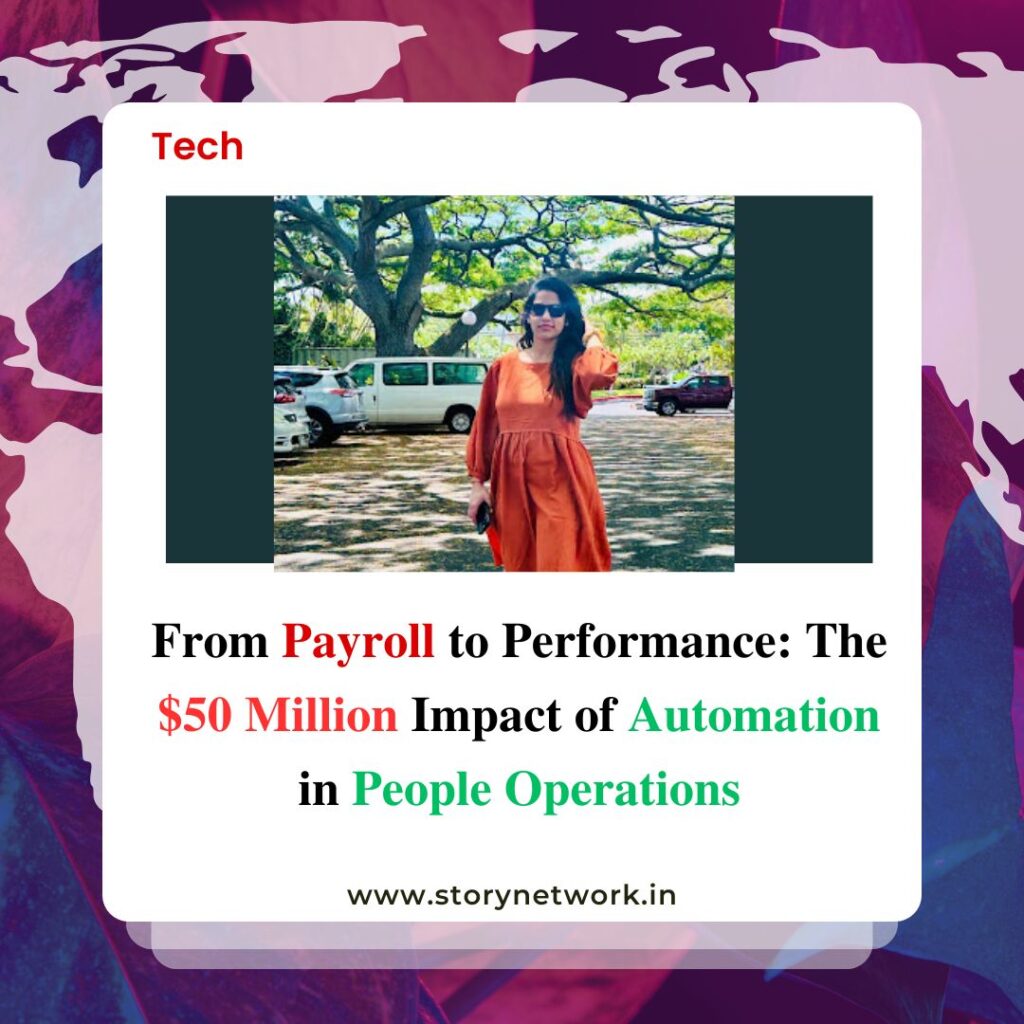The evolution of people operations is no longer a mere support function; it has become a core driver of organizational efficiency and growth. By integrating advanced automation into HR processes, companies are achieving unprecedented cost savings, productivity gains, and employee satisfaction. Under the leadership of Manasa, a visionary in HR innovation, organizations are now leveraging automation to redefine the employee experience and drive bottom-line impact—unlocking up to $50 million in measurable benefits.
The Payroll Transformation
Payroll management, often regarded as one of the most complex and error-prone HR processes, has undergone a significant transformation with automation. Traditional payroll systems relied heavily on manual data entry, approvals, and compliance tracking, leading to inefficiencies and inaccuracies.
By introducing automated payroll systems, companies have achieved:
- 99.9% Accuracy: Automation eliminates human errors in calculations, ensuring employees are paid accurately and on time.
- Faster Processing Times: Automated workflows have reduced payroll cycle times by 70%, enabling more agile financial management.
- Compliance at Scale: Intelligent systems ensure compliance with labor laws and tax regulations across multiple geographies, mitigating risks and penalties.
Manasa highlights that automation in payroll is more than just a cost-saving measure—it’s a step toward improving trust and transparency in the workplace. “When employees know their compensation is handled seamlessly, it strengthens their confidence in the organization,” she says.
Performance Management Revolutionized
Beyond payroll, automation is driving significant impact in performance management—a critical area for nurturing talent and aligning individual goals with organizational objectives.
1. Real-Time Feedback and Recognition
Automated performance management tools provide real-time insights into employee achievements. Managers can instantly recognize contributions, fostering a culture of appreciation and motivation.
2. Data-Driven Evaluations
With AI-powered analytics, performance reviews are now backed by data rather than subjective opinions. This has led to:
- Greater fairness in evaluations.
- Improved employee engagement.
- Enhanced decision-making for promotions and rewards.
3. Personalized Development Plans
Automation enables HR teams to create customized learning and development programs based on an employee’s performance metrics and career aspirations.
The Financial Impact of Automation
Automation in people operations is more than a technological upgrade—it’s a strategic investment with tangible financial returns. Organizations have reported:
- $50 Million in Annual Savings: Streamlined payroll, reduced errors, and optimized workforce planning have collectively resulted in significant cost reductions.
- 15% Increase in Productivity: Employees spend less time on administrative tasks, allowing them to focus on strategic priorities.
- 25% Reduction in Turnover: Automated systems ensure timely feedback, transparent processes, and career growth opportunities, improving employee retention.
Manasa notes, “The financial impact of automation is a testament to its ability to transform not just operations but also organizational culture.”
The Employee Experience: A Human-Centric Approach
While automation focuses on efficiency, its ultimate goal is to enhance the human aspect of people operations. At the core of this transformation lies the employee experience:
- Simplified Processes: Employees can now access payroll, performance data, and learning resources with a single click, reducing frustration and improving engagement.
- Proactive Support: Automated systems identify potential issues, such as burnout or dissatisfaction, and flag them to managers for timely intervention.
- Inclusion and Fairness: By removing biases from performance evaluations and payroll processes, automation fosters a more equitable workplace.
Challenges and Future Opportunities
Despite its transformative potential, automation in people operations comes with challenges:
- Data Privacy: Protecting sensitive employee information is paramount.
- Change Management: Organizations must guide employees through the transition to automated systems to ensure adoption and trust.
- Continuous Improvement: Automation systems must evolve to meet changing workforce needs and regulatory landscapes.
Looking ahead, Manasa envisions a future where automation integrates seamlessly with AI-driven insights, further enhancing workforce planning, diversity metrics, and employee well-being programs.
Under Manasa’s leadership, automation in people operations is creating a profound ripple effect—from payroll precision to performance excellence. By unlocking more than $50 million in annual impact, this transformation showcases the potential of technology to empower both organizations and employees.
“Automation is not about replacing humans; it’s about enabling them to focus on what truly matters—innovation, creativity, and connection,” Manasa concludes.

